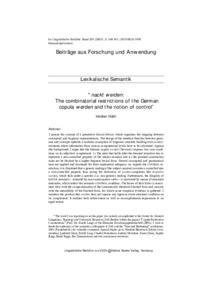Datum
2005Autor
Härtl, HoldenSchlagwort
400 Sprachwissenschaft, Linguistik GrammatiktheorieVerbalisierungKopulaAttributives AdjektivMentales LexikonMetadata
Zur Langanzeige
Aufsatz

*nackt werden: The combinatorial restrictions of the German copula werden and the notion of control
Zusammenfassung
I pursue the concept of a generative lexical device, which organizes the mapping between conceptual and linguistic representations. The design of the interface function between grammar and concepts upholds a modular conception of linguistic structure building even in environments where information from various computational levels have to be calculated. Against this background, I argue that the German copula werden ('become') imposes two core conditions on its adjectival complement: i.) The state that holds after the denoted transition has to represent a non-controlled property of the subject nominal and ii.) the planned construction must not be blocked by a higher frequent lexical form. Several conceptual and grammatical tests are applied and examined for their explanatory adequacy. As regards the CONTROL restriction, it is illustrated that a generic reading of the subject nominal converts a controlled into a non-controlled property thus saving the derivation of werden-complexes like kostenlos werden, which fails under a specific (i.e. non-generic) reading. Furthermore, the illegality of DATIVE nominals – tolerated by most unaccusative verbs – is motivated by means of structural rationales, which reflect the semantic CONTROL condition. The factor of BLOCKING is associated, first, with the compositionality of the (semantically identical) blocked form and, second, with the attestability of the blocked form, for which some empirical evidence is gathered. I maintain the position that werden does not impose any rigorous event structural condition on its complement: It realizes both achievement as well as accomplishment expressions to an equal extent.
Zitierform
In: Linguistische Berichte Band 203 / 3 (2005) , S. 349-381 ; issn:0024-3930Förderhinweis
The work I am reporting on in this paper was mainly accomplished at the Centre for General Linguistics, Typology and Universals Research (ZAS Berlin) within the project "Copula-Predicative Constructions" (Prof. Dr. Ewald Lang) of the Deutsche Forschungsgemeinschaft (DFG).Zitieren
@article{doi:10.17170/kobra-202105193928,
author={Härtl, Holden},
title={*nackt werden: The combinatorial restrictions of the German copula werden and the notion of control},
journal={Linguistische Berichte},
year={2005}
}
0500 Oax
0501 Text $btxt$2rdacontent
0502 Computermedien $bc$2rdacarrier
1100 2005$n2005
1500 1/eng
2050 ##0##http://hdl.handle.net/123456789/12993
3000 Härtl, Holden
4000 *nackt werden: The combinatorial restrictions of the German copula werden and the notion of control / Härtl, Holden
4030
4060 Online-Ressource
4085 ##0##=u http://nbn-resolving.de/http://hdl.handle.net/123456789/12993=x R
4204 \$dAufsatz
4170
5550 {{Grammatiktheorie}}
5550 {{Verbalisierung}}
5550 {{Kopula}}
5550 {{Attributives Adjektiv}}
5550 {{Mentales Lexikon}}
7136 ##0##http://hdl.handle.net/123456789/12993
<resource xsi:schemaLocation="http://datacite.org/schema/kernel-2.2 http://schema.datacite.org/meta/kernel-2.2/metadata.xsd"> 2021-07-08T11:32:36Z 2021-07-08T11:32:36Z 2005 doi:10.17170/kobra-202105193928 http://hdl.handle.net/123456789/12993 The work I am reporting on in this paper was mainly accomplished at the Centre for General Linguistics, Typology and Universals Research (ZAS Berlin) within the project "Copula-Predicative Constructions" (Prof. Dr. Ewald Lang) of the Deutsche Forschungsgemeinschaft (DFG). eng 400 *nackt werden: The combinatorial restrictions of the German copula werden and the notion of control Aufsatz I pursue the concept of a generative lexical device, which organizes the mapping between conceptual and linguistic representations. The design of the interface function between grammar and concepts upholds a modular conception of linguistic structure building even in environments where information from various computational levels have to be calculated. Against this background, I argue that the German copula werden ('become') imposes two core conditions on its adjectival complement: i.) The state that holds after the denoted transition has to represent a non-controlled property of the subject nominal and ii.) the planned construction must not be blocked by a higher frequent lexical form. Several conceptual and grammatical tests are applied and examined for their explanatory adequacy. As regards the CONTROL restriction, it is illustrated that a generic reading of the subject nominal converts a controlled into a non-controlled property thus saving the derivation of werden-complexes like kostenlos werden, which fails under a specific (i.e. non-generic) reading. Furthermore, the illegality of DATIVE nominals – tolerated by most unaccusative verbs – is motivated by means of structural rationales, which reflect the semantic CONTROL condition. The factor of BLOCKING is associated, first, with the compositionality of the (semantically identical) blocked form and, second, with the attestability of the blocked form, for which some empirical evidence is gathered. I maintain the position that werden does not impose any rigorous event structural condition on its complement: It realizes both achievement as well as accomplishment expressions to an equal extent. open access Härtl, Holden DFG-Projekt "Kopula-Prädikativkonstruktionen" Grammatiktheorie Verbalisierung Kopula Attributives Adjektiv Mentales Lexikon acceptedVersion issn:0024-3930 3 Linguistische Berichte 349-381 Band 203 false </resource>
Die folgenden Lizenzbestimmungen sind mit dieser Ressource verbunden:

